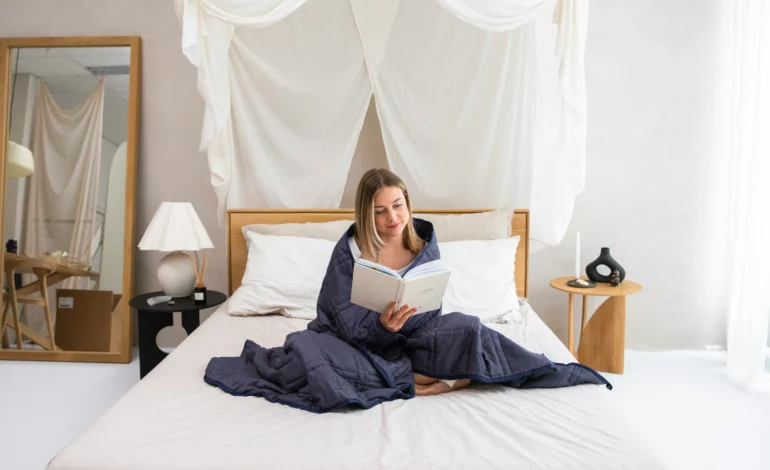10 Tips for Achieving the Perfect Night’s Sleep

Sleep is one of life’s greatest pleasures, yet many of us struggle to achieve the restful nights we crave. Tossing and turning can leave you feeling groggy and unfocused throughout the day. When it comes to quality sleep, knowledge is power. Understanding your body and creating an optimal sleep environment are essential steps toward getting those precious Zzzs.
Whether you’re a night owl or an early bird, there are simple strategies you can implement for better rest. From crafting a calming bedroom ambiance to choosing the right mattress, small changes can lead to significant improvements in your nightly routine. Ready to dive into tips that will help you wake up feeling refreshed? Let’s explore how you can unlock the secret to a perfect night’s sleep!
The Importance of Quality Sleep
Quality sleep is vital for both physical and mental well-being. It impacts everything from immune function to emotional regulation. When you’re well-rested, your body has a chance to repair itself, boosting overall health.
Sleep affects cognitive processes too. A good night’s rest enhances memory and improves focus. Without it, tasks may feel daunting and creativity can dwindle.
Moreover, consistent quality sleep contributes to better mood stability. Lack of sleep often leads to irritability and stress—two factors that can spiral out of control if unchecked.
In our fast-paced world, prioritizing restful nights isn’t just beneficial; it’s essential for longevity and happiness. Health experts consistently emphasize the importance of making sleep a priority in daily routines for optimal performance in life’s many demands.
Understanding Your Sleep Cycle
Understanding your sleep cycle is key to improving the quality of your rest. Our sleep consists of various stages, primarily divided into REM and non-REM phases. Each stage plays a crucial role in rejuvenating our body and mind.
During non-REM sleep, which includes three distinct stages, our bodies undergo physical restoration. This is when growth hormone surges and repairs occur at cellular levels. The deeper the stage, the more restorative the effects.
On the flip side, REM sleep fuels cognitive functions like memory consolidation and emotional regulation. It’s fascinating how dreams play out during this phase.
Knowing that each cycle lasts about 90 minutes can help you plan your bedtime better. Aim for several complete cycles to wake up refreshed rather than groggy from interrupted sleep patterns. By tuning into these rhythms, you can enhance both mental clarity and overall well-being.
Creating a Relaxing Bedroom Environment
Your bedroom should be a sanctuary. Start by decluttering the space. A tidy room promotes calmness and relaxation.
Consider your color palette. Soft, muted tones like blues and greens create a peaceful atmosphere. Avoid bright colors that can energize you instead of soothing you.
Lighting plays a crucial role too. Opt for dimmable lights or bedside lamps with warm bulbs. This allows you to adjust the brightness as needed, signaling your body it’s time to wind down.
Incorporate plants or nature-inspired decor for added tranquility. They not only enhance aesthetics but also improve air quality.
Keep noise levels in check. Use thick curtains to muffle outside sounds or consider a white noise machine to drown out distractions when it’s time for bed.
Choosing the Right Mattress and Pillows
Selecting the right mattress and pillows can make a world of difference in your sleep quality. Everyone has unique preferences, so it’s essential to find what works best for you.
When choosing a mattress, consider factors like firmness and material. Memory foam offers contouring support while innerspring provides bounce. Test them out if possible; lie down for at least 10 minutes to get a feel.
Pillows are equally important. A good pillow should support your neck and maintain alignment with your spine. Side sleepers may need thicker options, while stomach sleepers generally benefit from something softer and flatter.
Don’t forget about the materials used—natural fibers like cotton or bamboo can help regulate temperature. Pay attention to allergies too; hypoallergenic options might be worth considering if you’re sensitive.
Investing time in selecting these elements can pay off big when it comes to restful nights and refreshed mornings.
Establishing a Consistent Sleep Schedule
A consistent sleep schedule is a game changer for your rest. By going to bed and waking up at the same time every day, you help regulate your body’s internal clock. This can make falling asleep and waking up feel effortless.
Start by picking a bedtime that allows for 7-9 hours of sleep. Stick with it, even on weekends. It might be tempting to stay up late or sleep in, but these habits disrupt your rhythm.
Pay attention to how you feel during the day. If you’re alert and focused, that’s a sign you’re on the right track. If not, adjust your schedule slightly until you find what works best for you.
Over time, this routine will signal to your body when it’s time to wind down or rise and shine. Embrace this habit as part of your wellness journey; it’s an essential step toward better sleep quality.
Limiting Screen Time Before Bed
The blue light emitted by screens interferes with melatonin production, a hormone crucial for sleep. When you scroll through social media or binge-watch shows before bed, your brain stays alert.
Try to limit screen time at least an hour before you hit the pillow. Instead of scrolling, consider reading a book or listening to calming music. These activities can help signal to your body that it’s time to wind down.
You might also want to create a tech-free zone in your bedroom. Charge devices outside the room so they aren’t tempting distractions when you’re ready to sleep.
Establishing this boundary can foster healthier habits and improve your overall quality of rest. The evening moments spent away from screens may become some of the most peaceful parts of your day.
The Benefits of Exercise for Better Sleep
Exercise is a powerful tool for improving sleep quality. Engaging in physical activity helps regulate your body’s internal clock, making it easier to fall asleep and stay asleep.
When you work out, your body temperature rises. After exercising, it drops back down, signaling that it’s time to rest. This natural process promotes deeper sleep cycles.
Additionally, regular exercise reduces anxiety and stress levels. Both of these factors can keep you tossing and turning at night. By incorporating movement into your daily routine, you create a more relaxed state of mind as bedtime approaches.
The type of exercise matters too; aerobic activities like jogging or swimming can be especially beneficial for enhancing sleep patterns. Even light activities like walking or yoga contribute positively.
Aim for consistency but also listen to your body’s cues regarding timing—too close to bedtime may energize rather than relax you!
Avoiding Stimulants and Heavy Meals Before Bedtime
What you consume before bedtime can make a world of difference. Stimulants like caffeine and nicotine are notorious for keeping you awake longer than you’d like. A cup of coffee in the afternoon might seem harmless, but it can disrupt your sleep cycle well into the night.
Heavy meals also pose challenges. Eating a large dinner too close to bedtime forces your body to work hard on digestion when it should be winding down. This can lead to discomfort and restless nights.
Instead, opt for lighter snacks if you’re hungry after dinner. Think yogurt or a piece of fruit—something that won’t weigh you down but will satisfy those late-night cravings without hindering your ability to relax.
Listening to your body’s signals is key here. Pay attention not only to what you eat but when you eat it, making adjustments as needed for better sleep quality throughout the night.
Relaxation Techniques to Help You Drift Off
Finding ways to relax before bed can transform your sleep experience. One effective method is deep breathing. Inhale slowly through your nose, letting your abdomen expand, and then exhale gently through your mouth. This simple technique calms the mind and prepares the body for rest.
Progressive muscle relaxation is another great option. Start at your toes and gradually tense each muscle group for a few seconds before releasing them. This practice not only reduces physical tension but also promotes mental tranquility.
Meditation can also be beneficial. Focusing on a mantra or simply observing your thoughts allows you to create space in a busy mind.
Consider gentle stretches or yoga poses designed for bedtime. These activities release stress while encouraging better circulation, setting the stage for peaceful slumber as you drift off into dreamland.
Seeking Professional Help for Persistent Sleep Issues
Sometimes, despite our best efforts, sleep can remain elusive. If sleepless nights are a regular occurrence for you, it may be time to seek professional help. Sleep disorders like insomnia or sleep apnea require specialized knowledge and treatment.
A healthcare provider can evaluate your situation through a thorough assessment of your sleep patterns and lifestyle habits. They might recommend a sleep study to monitor how you rest at night. This information can lead to tailored solutions that fit your specific needs.
Don’t hesitate to reach out if you’re struggling with persistent issues. Quality sleep is vital for overall health and well-being, so getting the right support is key in your journey towards better rest. Prioritizing this aspect of health could make all the difference in achieving that perfect night’s sleep you’ve been dreaming about.









